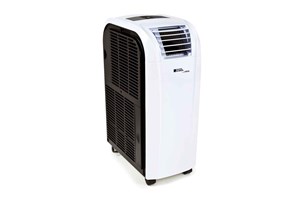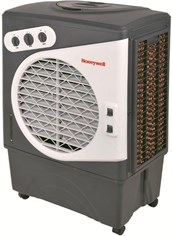What to look for in an Air Conditioning Unit
blog 28 Jul 2023
Before you hire or purchase an air conditioning unit, there are several factors to consider. What type of air conditioning unit is best suited for your purposes? What cooling capacity is needed? Where is it best to position an air conditioner for maximum effect?
Types of Air Conditioning and Coolers
Within the Sunbelt Rentals Climate Control range, we have different types of units available.
Portable Air Conditioning
Portable air conditioner units include mini cooler units, water-cooled condenser systems and powerful spot coolers which can be used in conjunction with exhaust ducting. As the name implies, an advantage of these units is their portability. They can be easily moved from one area to another and are ideal for the cooling of small to medium-sized spaces.

Evaporative Coolers
Evaporative coolers - also known as swamp coolers - cool air through the evaporation of water. They simply require a supply of water and access to power and are ideal for use in non-vented environments. One of the primary differences between an evaporative cooler and a portable air conditioning unit is that they do not have exhaust hoses or outside condenser boxes. They also use less electricity during operation.

Calculating the Cooling Capacity
The most important factor to consider when choosing an air conditioning unit is the amount of cooling output required to properly cool the area in question. This is typically measured in BTUs (British Thermal Units) per hour. A BTU represents the amount of energy it takes to heat one pound of water (about a pint) by one degree Fahrenheit.
The correct level of air conditioning output must be calculated as this can allow you to make savings on purchasing and hire costs. When calculating the level of air conditioning required for customers, our specialists also take several other factors into account such as:
- The size of the area being cooled
- The number of people who occupy the space
- The heat from equipment such as photocopiers and computers
- How many windows there are and where they are positioned e.g. if they are south facing
- Heat from lights
Bigger is Not Always Better
With air conditioning units, it’s not always the case that bigger units are better. Output is directly related to cost so the larger the capacity, the more a unit will cost to hire or purchase. An air conditioner that is too small won’t be able to keep up with load requirements on hot days. Similarly, a unit that is too large will cycle off and on too frequently and will do a poor job of dehumidifying the air, making the space feel uncomfortable. If anything, it’s advisable to slightly undersize an air conditioning unit than oversize it.
Positioning is Vital
Where you position your air conditioning unit will have a huge impact on its efficiency and effectiveness. Positioning is important from a cost point of view as your air conditioning unit will account for about a quarter of your electric bill when you do use it. From a comfort perspective, your space will feel far more comfortable more quickly if it is properly positioned.
Good locations for air conditioning units include:
- Areas where the natural airflow of the space works with the air conditioner, not against it. It’s best to avoid places such as facing an open door
- Locations where the airflow can move about freely. For example, avoid placing an air conditioner behind a piece of furniture
- By a plug point. It’s always best to avoid running extension cords to an air conditioner
- As close to the centre of the room as possible (unless you are using a window unit)
By contrast, poor locations for air conditioners include near appliances that generate heat such as stoves. Air conditioners have internal thermostats that shut the device off when the space reaches a certain temperature. If you locate your air conditioner near a heat-producing device, it may constantly run because it will detect the heat from the other appliance. Minimising the use of lights is also recommended. Light bulbs generate heat and this can adversely affect the performance of an air conditioning unit.
Get in touch today
Our air conditioning specialists can carry out a free, no-obligation site survey and offer advice as to which air conditioning units would be most efficient and effective. Please contact us for more information.

 Open your account online within 24 hours
Open your account online within 24 hours  Nationwide, next day delivery available
Nationwide, next day delivery available  Over 200 locations near you
Over 200 locations near you